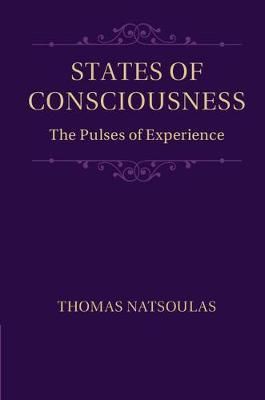Full Product Details
Author: Thomas Natsoulas (University of California, Davis)
Publisher: Cambridge University Press
Imprint: Cambridge University Press
Dimensions:
Width: 16.00cm
, Height: 2.60cm
, Length: 23.50cm
Weight: 0.770kg
ISBN: 9781107083509
ISBN 10: 1107083508
Pages: 452
Publication Date: 25 January 2018
Audience:
College/higher education
,
Professional and scholarly
,
Postgraduate, Research & Scholarly
,
Professional & Vocational
Format: Hardback
Publisher's Status: Active
Availability: Manufactured on demand

We will order this item for you from a manufactured on demand supplier.
Reviews
Advance praise: 'With his characteristic scholarship, Natsoulas presents an extraordinarily scholarly analysis of historical and more recent responses to William James' 'stream of consciousness', the successive states. This analysis begins with the contrast of Brentano's conscious representation and Bergman's logical positivism. We see diminished significance accorded consciousness from the Freudian unconscious to Skinner's radical behaviorism - then analyses of conscious state's from Gibson onward. It is all significant for the current literature.' Donelson Dulany, University of Illinois Advance praise: 'Thomas Natsoulas has written widely on consciousness with a psychologist's eye to philosophical themes. In States of Consciousness Natsoulas offers a running dialogue with historically significant thinkers. He debates subtle features of inner awareness with Franz Brentano, William James, Sigmund Freud, B. F. Skinner, Gustav Bergmann, J. J. Gibson, Brian O'Shaughnessy, and Galen Strawson. The give-and-take is equally instructive to psychologist, phenomenologist, philosopher of mind, and cognitive neuroscientist. Interacting with each of these research perspectives, Natsoulas shows in effect how Brentano's conception of inner consciousness remains absolutely crucial to our understanding of human consciousness even as its exact character is in debate.' David Woodruff Smith, University of California, Irvine
'With his characteristic scholarship, Natsoulas presents an extraordinarily scholarly analysis of historical and more recent responses to William James's 'stream of consciousness', the successive states. This analysis begins with the contrast of Brentano's conscious representation and Bergman's logical positivism. We see diminished significance accorded consciousness from the Freudian unconscious to Skinner's radical behaviorism - then analyses of conscious states from Gibson onward. It is all significant for the current literature.' Donelson E. Dulany, University of Illinois 'Thomas Natsoulas has written widely on consciousness with a psychologist's eye to philosophical themes. In States of Consciousness Natsoulas offers a running dialogue with historically significant thinkers. He debates subtle features of inner awareness with Franz Brentano, William James, Sigmund Freud, B. F. Skinner, Gustav Bergmann, J. J. Gibson, Brian O'Shaughnessy, and Galen Strawson. The give-and-take is equally instructive to the psychologist, phenomenologist, philosopher of mind, and cognitive neuroscientist. Interacting with each of these research perspectives, Natsoulas shows in effect how Brentano's conception of inner consciousness remains absolutely crucial to our understanding of human consciousness, even as its exact character is in debate.' David Woodruff Smith, University of California, Irvine
'With his characteristic scholarship, Natsoulas presents an extraordinarily scholarly analysis of historical and more recent responses to William James's 'stream of consciousness', the successive states. This analysis begins with the contrast of Brentano's conscious representation and Bergman's logical positivism. We see diminished significance accorded consciousness from the Freudian unconscious to Skinner's radical behaviorism - then analyses of conscious states from Gibson onward. It is all significant for the current literature.' Donelson E. Dulany, University of Illinois 'Thomas Natsoulas has written widely on consciousness with a psychologist's eye to philosophical themes. In States of Consciousness Natsoulas offers a running dialogue with historically significant thinkers. He debates subtle features of inner awareness with Franz Brentano, William James, Sigmund Freud, B. F. Skinner, Gustav Bergmann, J. J. Gibson, Brian O'Shaughnessy, and Galen Strawson. The give-and-take is equally instructive to the psychologist, phenomenologist, philosopher of mind, and cognitive neuroscientist. Interacting with each of these research perspectives, Natsoulas shows in effect how Brentano's conception of inner consciousness remains absolutely crucial to our understanding of human consciousness, even as its exact character is in debate.' David Woodruff Smith, University of California, Irvine 'With his characteristic scholarship, Natsoulas presents an extraordinarily scholarly analysis of historical and more recent responses to William James's 'stream of consciousness', the successive states. This analysis begins with the contrast of Brentano's conscious representation and Bergman's logical positivism. We see diminished significance accorded consciousness from the Freudian unconscious to Skinner's radical behaviorism - then analyses of conscious states from Gibson onward. It is all significant for the current literature.' Donelson E. Dulany, University of Illinois 'Thomas Natsoulas has written widely on consciousness with a psychologist's eye to philosophical themes. In States of Consciousness Natsoulas offers a running dialogue with historically significant thinkers. He debates subtle features of inner awareness with Franz Brentano, William James, Sigmund Freud, B. F. Skinner, Gustav Bergmann, J. J. Gibson, Brian O'Shaughnessy, and Galen Strawson. The give-and-take is equally instructive to the psychologist, phenomenologist, philosopher of mind, and cognitive neuroscientist. Interacting with each of these research perspectives, Natsoulas shows in effect how Brentano's conception of inner consciousness remains absolutely crucial to our understanding of human consciousness, even as its exact character is in debate.' David Woodruff Smith, University of California, Irvine
Author Information
Thomas Natsoulas is Emeritus Professor of Psychology at the University of California, Davis, and a fellow of the Association for Psychological Science and the American Psychological Association. He is the author of Consciousness and Perceptual Experience (Cambridge, 2013) and The Conceptual Representation of Consciousness (Cambridge, 2015).




